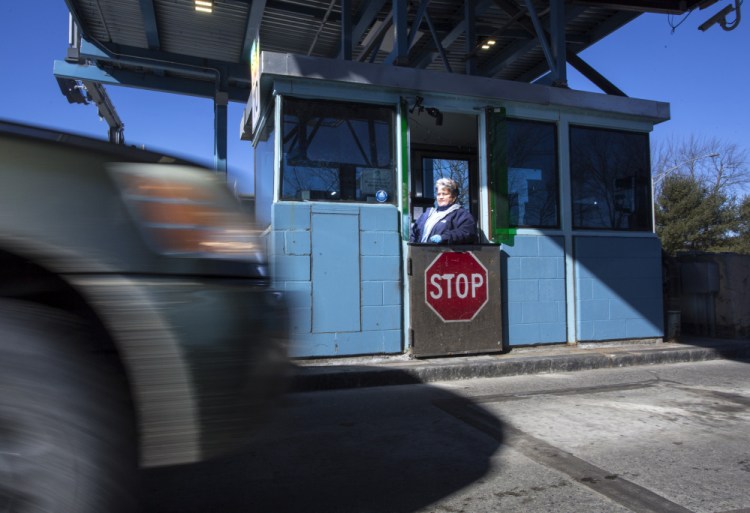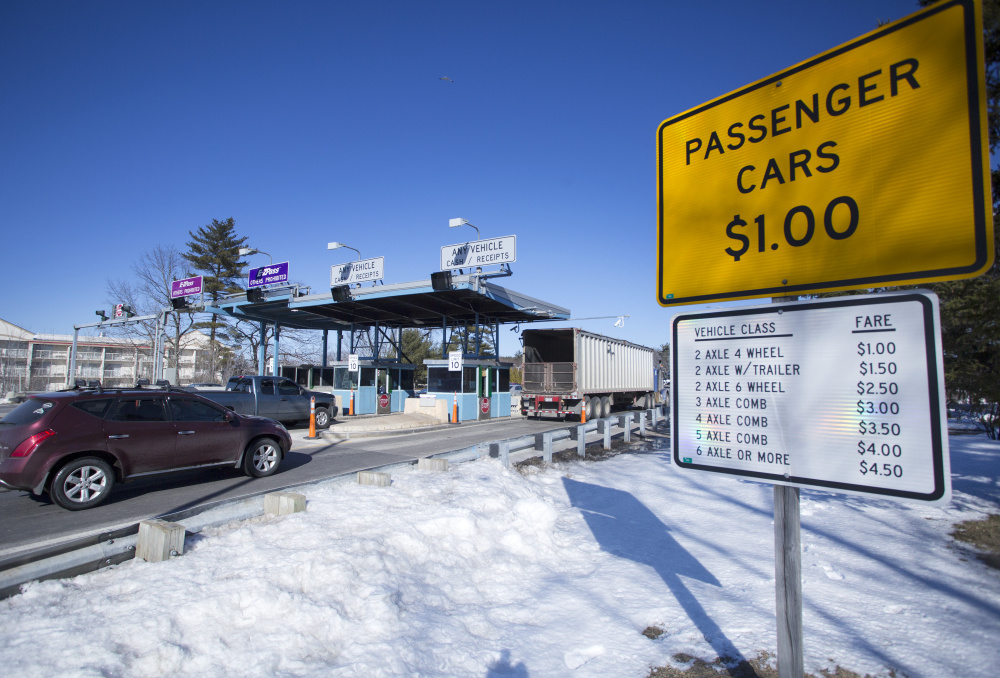The idea of doing away with the Maine Turnpike Authority and eliminating tolls has a long and unsuccessful history through both Democratic and Republican administrations.
Gov. Paul LePage revived the concept at a town hall meeting in Gorham on Wednesday night, saying he would like to see the turnpike authority merged with the Maine Department of Transportation and the elimination of almost all tollbooths, having one only in Kittery to collect tolls from out-of-state drivers.
“The only toll we should have is for the visitors coming in and out of the state in the summer months,” LePage said, adding that Mainers who work in New Hampshire could be offered tax credits to pay for their tolls. The governor said the process could take a decade to complete.
It’s unclear whether LePage was referring to legislation he is considering or merely explaining his vision for Maine’s highway systems. The governor’s media office did not respond to requests for elaboration Thursday.
If such a merger of agencies were to occur, vastly different financing and debt issues would have to be reconciled.
The turnpike authority’s 2016 budget was $135 million, including $43 million for repairs, construction and maintenance on the 109-mile highway. It also holds $385 million in debt.
The Department of Transportation’s annual budget is about $550 million, but officials have said it is underfunded by $75 million to $80 million a year.
Taking on that much more debt and road maintenance is a tall order for the Department of Transportation, which already is underfunded, said Maria Fuentes, executive director of the lobbying group Maine Better Transportation Association.
“It would be irresponsible to get rid of the tolls and have DOT take care of another 100-plus miles of road when they don’t have the ability to adequately maintain their own system,” Fuentes said. The turnpike gets steady funding through tolls, but the transportation department’s funding is reliant on the state’s per-gallon gas tax, which has seen a steady decline because of higher vehicle fuel efficiency, she said.
“I can understand the appeal. It sounds good to give drivers a break by getting rid of tolls, but practically speaking, it just doesn’t work,” Fuentes said.
THE CHALLENGE OF THE ECONOMICS
Peter Mills, executive director of the turnpike authority and a former longtime Maine lawmaker, concurred. A merger “would be a major undertaking for the state and the Department of Transportation,” he said.
The turnpike authority funds its daily operations almost exclusively with toll revenue. Last year, the authority collected $134 million in tolls, according to its data. More than 30 percent of the tolls – $41.6 million – was collected in the prime tourism months of June, July and August.
Those are also the three busiest months on the turnpike, when nearly 26 million transactions were recorded, a third of the highway’s 77.4 million transactions in 2016.
The southernmost toll booth, in York, collected $57 million in tolls in 2016, about 42.5 percent of the turnpike’s total toll revenue, Mills said.
While York is a major gateway to the state, out-of-state drivers make up about two-thirds of the tolls collected along the entire turnpike, Mills said. Mainers who use E-ZPass electronic transactions pay a lower toll, especially if they use the highway frequently.
“The current system is highly favorable to Maine residents, more so than it was in the 1980s,” Mills said.
LePage’s call for a merged highway system is familiar to Mills. The governor first proposed merging agencies in 2011, in the wake of a scandal involving the theft of gift cards by the turnpike’s former executive director, Paul Violette. At the time, Le- Page said he would have to see evidence that the agency was well-run before abandoning a merger.
OUTLIVING ITS PLANNED DEMISE
He also previously has said that he would like to put the toll burden on out-of-state visitors.
“He has made it very clear to us he would like to get rid of the tolls up north,” like the booths in Lewiston and Gardiner, Mills said. Removing tolls has support from drivers in interior parts of the state who feel unfairly penalized by interstate tolls.
“He has mentioned to me many times that he doesn’t see why someone in Waterville should have to pay a toll to get to the Maine Mall,” Mills said.
LePage was mayor of Waterville before he became governor.
His press secretary did not respond to a phone message requesting comment or an email with questions about whether the state would assume the turnpike’s assets and debt, how the state would offset the loss of toll revenue and pay to maintain highway miles, if tolls would only apply to out-of-state vehicles, and whether it would build a tollbooth in Kittery.
LePage isn’t the first governor to float the idea of merging the DOT and turnpike authority.
Established in 1941 to build an interstate highway using revenue bonds, the turnpike authority was supposed to dissolve when its construction debt was paid off in 1981. Instead, the Legislature retained the tolls to support the DOT rather than raise the state’s gas tax to finance it. Until the mid-1990s, a quarter of turnpike revenues was transferred to the DOT.
Democratic Gov. John Baldacci suggested merging the agencies in 2007 during a transportation budget shortfall. The proposal failed.
Independent Gov. Angus King raised the issue in a book he wrote before his election in 1994, but the proposal never got off the ground, said John Melrose, who served as transportation commissioner in King’s administration.
“The one thing that is always a stumbling block for the proposal is the amount of debt the turnpike has that the state would have to assume,” Melrose said.
The turnpike currently pays down its $385 million in bond debt with toll revenue. Ten years from now, when LePage envisions a merger would be complete, the agency’s debt will be just under $200 million, Mills said.
The state holds about $1.1 billion in bonded debt, including $442 million in general obligation bonds that can be used for transportation, and almost $100 million in debt secured with future federal transportation funds.
SUPPORT FROM LEWISTON-AUBURN
Still, in places like Lewiston-Auburn, the idea of removing tolls is popular. Auburn Mayor Jonathan LaBonte said businesses located off the highway, and in towns that use Lewiston to reach the interstate, are disadvantaged by the tolls. It also adds a burden to working families who have to use the interstate to commute out of town.
Parts of southern Maine have non-toll roads such as Interstate 295 and Route 1, but people in the Lewiston-Auburn area have to pay to use the turnpike, LaBonte said. He welcomes LePage’s proposal and would like to see it move forward.
“I think there is a lot of details to hash out, but anything to lessen the cost of doing business or living in Lewiston-Auburn, I’d be game to see go on the table,” he said.
Peter McGuire can be contacted at 791-6325 or at:
Send questions/comments to the editors.





Success. Please wait for the page to reload. If the page does not reload within 5 seconds, please refresh the page.
Enter your email and password to access comments.
Hi, to comment on stories you must . This profile is in addition to your subscription and website login.
Already have a commenting profile? .
Invalid username/password.
Please check your email to confirm and complete your registration.
Only subscribers are eligible to post comments. Please subscribe or login first for digital access. Here’s why.
Use the form below to reset your password. When you've submitted your account email, we will send an email with a reset code.